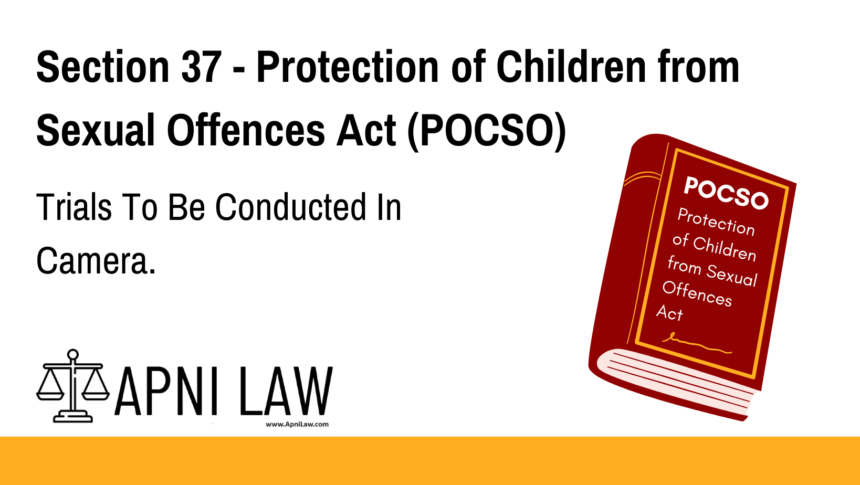Code: Section 37
The Special Court shall try cases in camera and in the presence of the parents of the child or any other person in whom the child has trust or confidence:
Provided that where the Special Court is of the opinion that the child needs to be examined at a place other than the court, it shall proceed to issue a commission in accordance with the provisions of section 284 of the Code of Criminal Procedure, 1973 (2 of 1974).
Explanation of Section 37 POCSO
Section 37 of the Protection of Children from Sexual Offences Act requires trials to be conducted in private. The court ensures that the proceedings are held away from the public eye to protect the child’s privacy and emotional well-being.
If the child finds it difficult to testify in court, the Special Court can provide an alternative. It may record the child’s testimony at a different location. This can be done through a commission as stated in Section 284 of the CrPC.
Key Provisions
- In-Camera Trials: All POCSO cases must be heard privately by the Special Court, away from the public.
- Support Persons: The child may have their parents or a trusted person present to offer emotional support.
- Alternative Testimony Locations: The Court may allow testimony to be recorded outside the courtroom if needed, following Section 284 of the CrPC.
- Judicial Discretion: The Special Court decides if it is in the child’s best interest to testify inside or outside the courtroom.
Illustrations
Illustration 1: In-Camera Proceedings
A young child is a victim in a POCSO case. The Special Court ensures that the trial is held in private. Only the judge, legal teams, and the child’s parents are allowed to attend.
Illustration 2: Testimony at a Neutral Location
A child is too traumatized to testify in the courtroom. The Special Court issues a commission, as per Section 284 CrPC, to record the child’s testimony at a safe location.
Common Questions & Answers on Section 37 POCSO
1. What does “trial in camera” mean?
It means the trial is conducted privately, away from the public and media, to protect the child’s identity and emotional well-being.
2. Who can attend an in-camera trial?
Typically, only the judge, legal teams, and the child’s trusted support persons can attend.
3. Can the child testify outside the courtroom?
Yes, if the Court believes it’s in the child’s best interest, they can testify outside the courtroom. This is done through a commission under Section 284 CrPC.
4. Why are in-camera proceedings necessary?
They help protect the child’s privacy and mental health, ensuring a safe environment for testimony.
5. Does the accused have the right to be present during in-camera proceedings?
Yes, the accused remains present to ensure a fair trial. However, the public and media are excluded.
Conclusion
Section 37 of the POCSO Act emphasizes the importance of protecting children during legal proceedings. The Court ensures privacy by holding trials in camera and allows for alternative locations if needed. This approach maintains the child’s dignity while ensuring justice. It strikes a balance between fairness and child protection.
For more insights into POCSO and other child protection laws, visit ApniLaw—simplifying the law for everyone.








